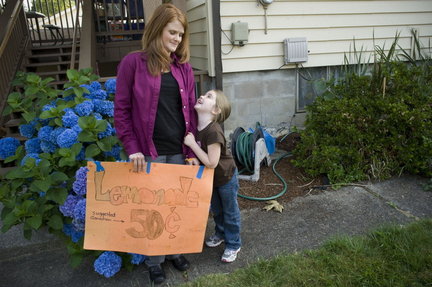County apologizes to 7-year-old entrepreneur

Art fairs are held worldwide in neighborhoods and museums on a regular basis. First Friday or Saturday fairs are a regular event in thousands of cities and towns year-round. In northeast Portland, Oregon there is a Last Thursday monthly art fair. In July, 2010, Julie Murphy saw Olivia, a cartoon pig, running a lemonade stand. The 7-year-old decided to try the same thing at the next Last Thursday event.
Julie and her mother, Maria Fife, worked on a sign and set up the stand. After thirty minutes or so, a lady with a clipboard approached them and asked for their license to run the stand. The county health department requires any vendor to obtain a permit for $120 if their product contained real fruit or wasn’t prepared under strict conditions. Although Julie’s lemonade was made from powder and didn’t contain fresh fruit, her mom’s kitchen wasn’t an approved facility. They would have to pack up and leave or face a $500 fine.

Julie and mom, Maria
Word about Julie’s plight spread quickly. Local businesses and a local radio station came to her aid. A protest was planned calling for others to set up similar stands at the next public event. After considering the situation, the county chairman, Jeff Cogan, apologized to Julie and her mom stating that running a lemonade stand is a “classic iconic American kid thing to do.”
As a result of the public outcry and publicity, Julie made over $1800. She and her Mom have planned a trip to Disneyland to wind up the summer.
What do you think about this incident? Are there instances when laws can be bent in the name of common sense? Is this one? Are you aware of laws in your town that remain on the books but are rarely if ever enforced? On the other hand, does everything have to be covered by a law? Shouldn’t we be left with some decision-making based on right and wrong and morals? Do you ever consider what’s the ethical thing to do without having to check if there’s a law about it?
More youthful entrepreneurs: In another example of young kids learning the ways of business is the story of the Charais children in Idaho. Just before Halloween, 2010, Jacob (age 4) and Sammy (age 6) started to sell pumpkins in their front yard. They were visited by a lady from the Idaho State Tax Commission. She told Mrs. Charais that they were operating their business without a license thereby avoiding the payment of taxes. The kids received the pumpkins from a local farmer and agreed to split the sales with him. He and other farmers had no objection to the kids pumpkin stand. The state has a $100/day fine for violators but said it would not be enforced in this case.




That is plainly stupid. We encourage children to become entrepreneurs and at the same time stop them from doing so? This is the most extreme way to “apply the law”.